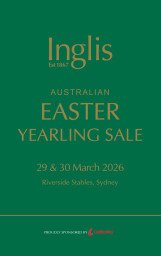14th Dec 2009

Racing Victoria - Thursday, 10 December 2009
Racing Victoria Limited (RVL) has announced changes to its procedures regarding the approval of un-raced horses to compete in races, following a detailed review of current procedures, including consultation with the Australian Trainers Association (ATA).
Effective from 1 January, 2010, every un-raced horse will have to be deemed as suitable for racing by RVL stewards before it is allowed to debut on Victorian tracks.
Previously licensed agents were permitted to undertake this function throughout the state, however RVL stewards will now have the sole responsibility to pass horses to race.
Under changes to Local Rule 50, a horse must compete in a jump-out or official trial, over at least 600 metres and with at least two other horses, to the satisfaction of RVL stewards before it is permitted to race.
In addition, trainers may seek permission to conduct jump-outs for un-raced horses at private training facilities under the supervision of RVL Stewards, provided they meet a stringent approval process.
Additional changes to the policy regarding un-raced horses are;
“It is important for horse and rider safety that all un-raced horses are passed as safe and tractable by RVL stewards before they are allowed to compete in a race,” Saundry explained.
“These changes strengthen the system currently in place and ensure that un-raced horses have satisfactorily completed a jump-out or official trial over at least 600 metres under the critical eye of RVL stewards.
“Trainers with private facilities can make application for un-raced jump-outs to be conducted at their track, however they will need to satisfy a stringent set of requirements pertaining to OHS and meet the costs of the attending RVL stewards.
“These enhancements provide a better structure for trainers who now have a clear path to qualify their horse through jump-outs with a monthly scheduled to be published in Inside Racing and on the RVL website.”
As part of its detailed review, RVL investigated the option of making all un-raced horses compete in official trials prior to their debut, but this was not deemed as a viable option.
“Our review determined that it was neither practical nor economically viable for RVL, Clubs and owners to adopt a system whereby all un-raced horses were passed suitable for racing in official trials,” Saundry explained.
“We were cognisant of the costs to owners and the industry, together with the negative impact we believe it would have on the size of our race fields.”
-thumb.jpg)
8, 9, 10 February 2026
-thumb.jpg)
1, 2, 3 March 2026

29, 30 March 2026

30 January - 4 February 2026

30 January - 4 February 2026

19 April 2026